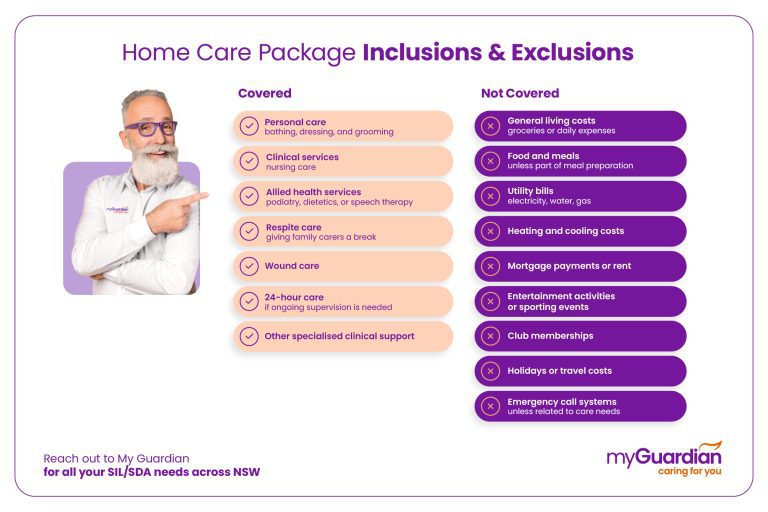All About Home Care Solutions for Individuals With Disabilities: NDIS Registered Support
Home care services under the NDIS play an essential function in supporting people with specials needs. These solutions are made to improve everyday living through tailored assistance, ranging from individual like wheelchair assistance. Understanding exactly how to browse these alternatives can be complex. This summary checks out the numerous facets of NDIS home treatment, from available services to the selection of providers, highlighting vital factors to consider for those looking for support. The trip towards equipped treatment begins right here.
Comprehending the NDIS and Its Objective
The National Handicap Insurance Policy Scheme (NDIS) functions as a transformative framework designed to offer support and services for individuals with specials needs. Developed to boost the top quality of life and warranty fair access to necessary sources, the NDIS equips participants by providing individualized plans customized to their one-of-a-kind requirements. It aims to cultivate self-reliance, allowing people to seek their individual goals and aspirations.Through a structured method, the NDIS allocates financing for numerous supports, including education, work help, and area participation. This all-inclusive scheme not only concentrates on instant care yet likewise highlights long-term developmental results. By advertising selection and control, the NDIS urges participants to pick their favored service providers, assuring that care straightens with their values and choices. Inevitably, the NDIS represents a significant dedication to enhancing the lives of people with disabilities, cultivating inclusivity, and building a more supportive society.
Sorts Of Home Care Services Available
Various kinds of home treatment solutions cater to people with handicaps, primarily focusing on personal care assistance and reprieve treatment alternatives. Personal care assistance offers important support with daily activities, while respite care supplies temporary relief for primary caretakers. Recognizing these services is crucial for ensuring the well-being of both people with disabilities and their families.
Personal Care Support
While maneuvering day-to-day life can offer obstacles for people with handicaps, individual care aid provides crucial assistance tailored to their distinct needs. This type of home care solution encompasses a range of tasks designed to promote independence and boost lifestyle. Personal care aides help with daily jobs such as showering, clothing, brushing, and toileting, making sure individuals keep personal hygiene and comfort. They might likewise assist with dish prep work, medication monitoring, and wheelchair support. By offering personalized care, these experts equip individuals to engage more totally in their everyday routines and social tasks. On the whole, individual care aid plays a significant role in cultivating self-respect and autonomy for those with impairments, allowing them to grow in their home environment.

Reprieve Care Options
Reprieve treatment functions as a crucial resource for households and caretakers of people with specials needs, offering momentary relief from the needs of day-to-day caregiving. This kind of service can take different kinds, consisting of at home respite care, where experienced specialists see the home to assist with treatment tasks. Family members may opt for facility-based respite care, where people obtain treatment in a customized atmosphere, allowing caretakers to take a break. Furthermore, some organizations offer emergency situation respite solutions for unexpected situations. These options not only assist relieve caregiver stress and anxiety however additionally advertise the well-being of people with disabilities by offering them new experiences and social communication. Generally, break care plays a vital duty in supporting both caretakers and those they look after.

How to Gain Access To NDIS Home Treatment Solutions
Accessing NDIS home care services includes recognizing the eligibility requirements stated by the National Disability Insurance Coverage Plan. People have to browse an organized application process to protect the needed assistance customized to their demands. This area will certainly clear up both the qualification needs and the actions associated with obtaining services.
Qualification Standards Clarified
To get approved for NDIS home treatment services, individuals must meet specific eligibility standards that analyze their conditions and requirements. Applicants should be aged in between 7 and 65 years and have a permanent and significant disability that impacts their capacity to do everyday activities. Additionally, they need to be an Australian resident, an irreversible homeowner, or hold a Protected Special Category Visa. The NDIS requires proof of the disability, usually via medical evaluations or records. In addition, people should show that they call for assistance to take part in financial and social life. These standards assure that services are directed in the direction of those who really require aid, promoting freedom and improved high quality of life for individuals with disabilities.
Application Refine Actions
Can I Select My Very Own Support Workers With NDIS?
The private asked whether they could pick their own support workers under the NDIS structure. Generally, participants have the adaptability to select support employees, cultivating personalized treatment that aligns with their certain requirements and choices.
What Happens if My Needs Adjustment After Obtaining Support?
They need to interact these adjustments to their service provider if a person's needs modification after getting support. Modifications can be made to the treatment strategy, guaranteeing that the assistance stays appropriate and efficient for their scenarios.

Exist Limits on The Number Of Hours of Treatment I Can Receive?
The individual asked about potential limits on the number of care hours obtained. Generally, such limitations article source may exist based on particular policies or funding arrangements, emphasizing the importance of examining agreements and guidelines regularly.
Can I Make Use Of NDIS Financing for Home Alterations?
The concern of utilizing funding for home alterations develops frequently. Normally, individuals might utilize NDIS financing for required alterations to their homes, making certain accessibility and security, set upon conference specific eligibility standards and standards.
Exactly how Do I Take care of Grievances Regarding My Home Care Solutions?
To deal with complaints concerning home treatment services, individuals must first record their issues. Then, they can connect straight with their service company, seeking resolution, or rise the concern to pertinent oversight bodies if essential. Home care solutions under the NDIS play a crucial function in supporting people with handicaps. Different kinds of home care services cater to people with handicaps, mostly focusing on individual treatment aid and reprieve care options. home care providers. Personal care help provides vital assistance with everyday tasks, while reprieve treatment provides short-lived alleviation for main caregivers. Family members may decide for facility-based respite care, where individuals get care in a specialized setting, enabling caretakers to take a break. How can families effectively manage the financial aspects of home care services for individuals with handicaps?